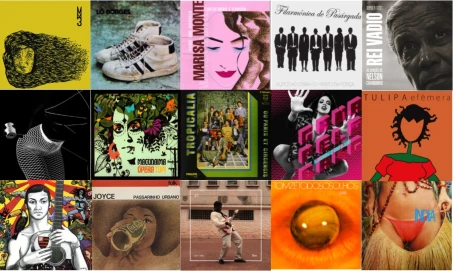Looking back over my previous top ten lists, 2023 holds up well. The longer I’ve been at this, the more proficient I’ve gotten to finding good albums thanks to a mix of algorithms and sources. Also my ears get more and more attuned to the aural feel of music from Brazil: whenever I take a break from Brazil, it’s not too long before I miss the cadences of its sounds. Eventually I’ll stop doing this. (I actually put out fewer posts in 2023 than I did in any previous year.) But even when I stop doing the blog, I’m confident I’ll listen to the music I’ve discovered through it until I can’t listen to anything anymore.
But enough about me and the blog. What about 2023?
First, as always, take the “favorite” seriously. I’m long past trying for any whiff of objectivity or expertise in these things. This is just stuff I liked. You may or may not. You might be thrilled at one of those B- albums I like fine but will never actually listen to again. I’m tempted to follow Chris Monsen’s lead and not rank stuff. But I know some people like the numbers game. I guess I do, too. So the albums graded A- or higher are ranked. The B+ albums, however are alphabetical. I did put a * by a few of the ones closest to the top.
This year’s A-list has plenty of old favorites. Two Clube members land three albums, including that Fróes record that only I seemed to love. Marina Sena could well be setting herself up for a decade dominating run. Patrícia Bastos and Adriana Calcanhotto reminded what talents they can be. Jards Macalé leaned into his second collaboration with the Clube da Encruza for perhaps the best album of his career. But the A-list also includes five artists I’d never heard or heard of before this year as well as three I had merely passing knowledge of. The well of great music from Brazil doesn’t seem anywhere close to drying up, and given that culture’s love of music—perhaps only surpassed by football—there’s no reason to think it ever will.
As I said in my 2023 playlist post, music from Brazil is more varied than Anglophone marketing would have you believe, so below find 33 albums, some of which will fit exactly what you expect with that term as well many more that will expand your horizons on what Brazilian musicians do. I hope you love this stuff half as much as I do.
A-List
- Filipe Catto, Belezas São Coisas Acesas por Dentro (A)
- Ricardo Dias Gomes, Muito Sol (A)
- Marina Sena, Vício Inerente (A-)
- Patrícia Bastos, Voz da Taba (A-)
- Romulo Fróes and Tiago Rosas, Na Goela (A-)
- Anne Jezini, Em Fuga (A-)
- Rodrigo Campos, Pagode Novo (A-)
- Slipmami, Malvatrem (A-)
- Febem, Fleezus and CESRV, Brime! (Deluxe Edition) (A-)
- Ian Ramil, Tetein (A-)
- Jards Macalé, Coração Bifurcado (A-)
- Adriana Calcanhotto, Errante (A-)
- YMA and Jadsa, Zelena (A-)
- Cabezadenego, Mbé and Leyblack, Mimosa (A-)
- Romulo Fróes and Rodrigo Campos, Elefante (A-)
- Os Tincoãs, Canto Coral Afrobrasileiro (A-)
- María Freitas & Jazz das Minas, Ayé Òrun (A-)
Honorable Mentions (B+)
- Ana Frango Elétrico, Me Chama de Gato Que Eu Sou Sua
- Bixarte, Traviarcado
- Rodrigo Brandão, Outros Estado*
- Sophia Chablau e Uma Enorme Perda da Tempo, Música do Esquecimento*
- Dossel, Badoque
- Fleezus, Off Mode
- Nei Lopes, Nei Lopes 80
- Carlos Lyra, Afeto
- Nuven, Zero
- Rodrigo Ogi, Aleatoriamente
- Ná Ozzetti, Zécarlos Ribeiro and Danilo Penteado, Ná Canta Zécarlos Ribeiro
- Sara Não Tem Nome, A Situação*
- Tasha & Tracie, Kyan and Rapper Gregory, Yin Yang
- Thrills & the Chase, Thrills After Dark*
- Tori, Descese
- Anna Vis, Como Um Bicho Vê
